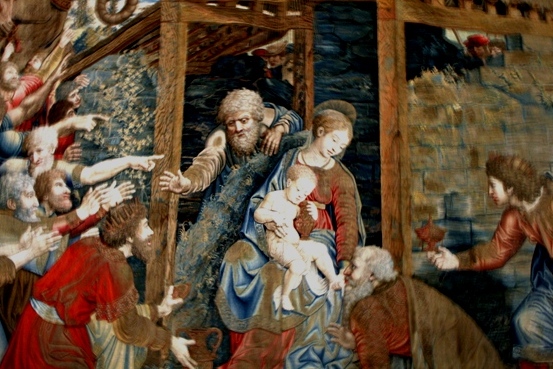University Values and Professorial Roles
I was recently asked to reflect on potential core values of the university at which I teach. The exercise prompted me also to ponder my role as professor.
A strong university should have several values at its core. As I reflected on possible values to include among the most important, I focused on one that resides both at the core of the Christian faith and at the core of what I think a great university should be. That value is love.
 We best understand love in terms of promoting overall well-being. “Well-being” is another way to talk about the abundant life that Jesus gives, being a blessing, shalom/peace, eudemonia, flourishing, true happiness, wholeness/healing, etc. Well-being and “salvation” come from the same root word. Promoting well-being includes a vast array of actions.
We best understand love in terms of promoting overall well-being. “Well-being” is another way to talk about the abundant life that Jesus gives, being a blessing, shalom/peace, eudemonia, flourishing, true happiness, wholeness/healing, etc. Well-being and “salvation” come from the same root word. Promoting well-being includes a vast array of actions.
In my view, all Christian institutions, churches, and groups should take love as one of their core values. As I reflected on my situation, however, I found myself concentrating on a particular expression of love. Jesus emphasizes this expression when he says we should love God with our minds. Christian educational institutions should encourage students to love — to promote well-being — by developing the life of the mind.
Loving with Our Minds
Loving with our minds can mean many things. Sometimes it means memorizing facts, figures, ideas, or theories. I sometimes call this “Trivia Pursuit” education. Memorizing facts and theories can be important, but I don’t think memorization is usually the most important way we love with our minds.
Loving with our minds can also mean developing skills. I sometimes call this “technique” education. Having skills is important, because skills help students get jobs, make money, and contribute to a profession. I don’t think, however, that learning techniques is usually the most important way we love with our minds.
A third way of loving God with our minds is what Old Testament writers called becoming wise. The Apostle Paul said wisdom entails being transformed by the renewing of our minds. Those who love wisely build their houses on a solid rock instead of shifting sand, said Jesus. We might call this third way, “The transformation of the mind in the pursuit of wisdom.”
Love Sometimes Means Risk
Loving God with our minds is risky business. Loving in this way is often unsettling. It means changes in our worldviews. It involves what New Testament writers called “metanoia.”
My university chemistry colleague, Jennifer Chase, compares the way she teaches chemistry to the way I teach theology. On the first day of chemistry class, Jennifer says to students, “Everything you learned in High School chemistry is wrong!”
Jennifer’s students generally listen and, with little or no objection, plunge ahead to learn chemistry anew. In reality, of course, much of what they learned in High School remains helpful and true. Jennifer’s point is that students need to think differently than they have in the past.
Jennifer likes to say that theology professors like me would be banned from the university if we were to stand and say, “Everything you learned in Sunday School is wrong!” Students, parents, and pastors would be in an uproar.
Of course, I don’t think everything students learn about God before coming to my class is wrong. But I do know that students come to theology classes with particular expectations. And because views about God are central to their lives – more central than views of chemistry – my proposing new ways of thinking about God can be threatening.
Many students assume I will ask them to memorize the names of theologians, learn dates in Church history, and memorize doctrines. They expect to be better at Bible or theology trivia when they complete my course. When I challenge them to think about God, life, and the world in new ways, they can feel threatened.
Love Sometimes Causes Conflict
If
1) love is among my university’s core values,
2) loving God with our minds is something Christian universities especially promote,
3) and we value highly the transformation that comes from seeking wisdom,
then universities like mine should expect conflicts to arise from time to time. While we should not provoke unnecessary conflict, transforming minds in the pursuit of wisdom is threatening business — especially at institutions of Christian higher education. A great deal is at stake!
I experienced my own changes of mind as a college student. I was fortunate, however to have supportive and understanding mentors. Parents, pastors, and professors became my moral authorities and fostered – often indirectly – my mental and spiritual development.
The Responsibility of the Professor
These days, I am keenly aware of the role I play in shaping the lives and minds of young people. It’s a huge responsibility. I occasionally think about Jesus’ words that what we bind on earth will be bound in heaven and what we loose on earth will be loosed in heaven. What I do as professor really matters.
A couple years ago, a student named Brian Mackey gave me a small glass container. In it was a Jello-like substance called “Gack.” Brian walked into my office, plunked the Gack on my desk, and said, “Oord, you’ve stolen my soul!” This was his way of saying I had convinced him to think in ways better than he had previously. 
I keep Brian’s gift on my office bookshelf. It reminds me I am in the ministry of shaping souls, although I don’t steal them!
In Medieval times, pastors were expected to devote years of study to the ministry before entering it. Clergy were thought of as “doctors of the soul.” In my mind, the healing business in which I engage can be of greater consequence than the healing business of the medical doctor down the street. I play a significant role in presenting the salvation God wants to provide my students.
When I think about the crucial role professors like me play in encouraging students to be transformed as they love with their minds, I admit I sometimes worry. After all, professors are far from perfect.
Professors Like Me Need Prayer
I know I’m far from perfect. Despite having a Ph.D., reading widely, having lectured on six of the seven continents, writing and researching extensively, etc., there is so much I don’t know. The Apostle Paul was right when he wrote that we see through a glass darkly. I know in part.
Not only do I know in part, I also make mistakes. I don’t always say the right word. I’m sometimes not as kind as I ought to be. I’m a flawed person and a work in progress. I need prayer!
But I’m also reminded of the final words in 1 Corinthians 13 and first words in the next chapter. Paul says that faith, hope, and love remain. And the greatest of these three is love.
In what I think was one of the biggest blunders in biblical notation history, someone centuries ago decided to split the first part of 1 Corinthians 14 from the end of 1 Corinthians 13. The original Greek manuscripts don’t require this break.
Universities Should Pursue Love
After Paul says that love is the greatest, he instructs his readers in what we think of as the first verse of chapter 14 with these words: “Pursue love.”
It’s not just enough to know love as a core value. We also must pursue love. We must act in love. If we know all things but do not love, says Paul, we are nothing. We are like clanging gongs and clashing symbols.
I like the way Eugene Peterson, author of The Message translation of the Bible, puts the first verse of Corinthians 14. Instead of just writing, “Pursue love,” Peterson translates the verse: “Go after a life of love as if your life depended on it. Because it does.”
As I think of the core values of my educational institution, I think a variation of Peterson’s words seems appropriate. My university should “go after a university life of love — especially developing the life of the transformed mind — as if its life depended on it.” In my view, my university’s life really does depend on love: God’s love for us and our responses of love for God, others, and ourselves.


Comments
Tom, an experience to share…a few years ago after graduation one of my BibLit students saw me from a distance and made a beeline through the crowd to give me a hug, express appreciation, and thank me for my teaching. If I am ever discouraged about the task of loving God with all my mind, and teaching others to do so, I just have to relive that experience and I am encouraged once again.
Probably, I shouldn’t tell students we’ve lied to them… just that the oversimplifications were SO many and so significant that it has little application to reality?
I know, Tom, that you are always striving for them to understand God better & have a picture of Him that is more consistent in it’s image of God’s love.
How do theologians & philosophers ascertain the best degree of incline towards a more TRUE understanding of God? In biology & chemistry, the “truth” is more complicated, requires more terms in the calculations, and is harder to quickly describe. It almost never causes problems in our family. Almost no revelation in biology shakes students core beliefs because they had VERY little built on those foundations. (well, maybe it’s distressing when one finds out that a cup of water plus a cup of ethanol wouldn’t give 2 cups of liquid after mixing!) Even still, we move fairly slowly through layers of information & complexity.
The opposite seems to be true in theology. Yet, sometimes theologians rip quickly through layers of ideas on which much of a student’s “faith” is built. Can one go too slowly in that case? DOes it depend on how interconnected the faith of a person tends to be to each idea?
Thanks for working so dilligently at your (and even my!) teaching & learning
I think that it important to think about how your career relates to the worldview that you have articulated throughout your entire life. I will take the lessons of this blog to heart as I get close to graduating and hopefully getting a job of my own, also thinking about the way that I can use my own career to express love in the world. Thanks for this interesting and revealing post!
Well done. Just as a small side note Dr. Chase is now a biology professor. I agree wholeheartedly that Christian institutions should have love as their core value. Too often they are known for what they are opposes to intead of what they actually do. I also agree that at our university students should be exposed to alternate views on theology so they can decide for themselves what they believe and make their faith personal and not just what they have been told. However in this process there needs to be ample support and alternative answers given after a students core beliefs have been torn down. It is a sad reality that some students actually lose their faith after having a theology class at a Christian school.
Tom,
You did it again. When you first said that Love should be the core value of a university I wondered, “Okay, how’s this one gonna go.” just when I thought you were getting out there you save the day, “Jesus emphasizes this expression when he says we should love God with our minds. Christian educational institutions should encourage students to love—to promote well-being—by developing the life of the mind.”
This is so true. Students, especially of theology, need to be encouraged to engage their beliefs, thoughts, and preconceived notions. Engage them, wrestle with them, be deliberate about their beliefs about God. Make their faith their own, not just rely on the beliefs they were served up in Sunday School. Because as you say about university professors knowing imperfectly can be said even more emphatically about lay SS teachers.
Those who believe that they know all that is knowable about God make me nervous. Actually, I think that attitude is proof of not really knowing anything. Struggling with uncomfortable ideas can only strengthen my faith as I grow in knowledge-loving God with ALL my mind requires my mind be challenged. I see Jesus doing just this as He goes about teaching, He challenges dearly held beliefs and true students walk away with a fuller understanding, a deeper faith.
Tom,
I so look forward to your blogs! They are always so well done. Let me chime in with WIlliam Hanson that ‘a tearing down of core beliefs’ requires a careful healing process. Having had surgery just 7 weeks ago, my surgeon is still checking on me, making sure my wound is healing properly, that the incision is clean and not infected, etc… Seems to me that if you are going to do ‘risky business’ and you, unlike the ‘risk taking God’ of whom you so often speak, cannot stay engaged for every moment of the healing process, you will need to make sure someone else is. Perhaps a pastor, Sunday School Teacher, etc… It just seems to me that God takes risks because God is always there to manage those risks… Not sure a loving prof can do that? Perhaps a loving prof will need to consider how his risky teaching exposes his students to risks he will not be able to navigate them through… I think William is on to something. We who teach and preach for a living have to always keep this ‘exposing others to risk’ in mind, precisely because we are not God and cannot manage every moment of that risk taking…
Thanks for reminding parents of the risk involved when sending their children to you for further education. I suspect they need to understand that before they send them…
You’ve expressed well the core value of a liberal arts education, especially at a Christian institution. If such an institution is to be “Christian” is must be honestly, authentically, and truthfully so. As a 10-year member of the board of trustees of such an institution I can testify to the great numbers of hours spent standing between incensed parents, pastors and lay leaders in the constituency who were intent on stopping the enterprise you describe, and dedicated faculty members trying to do there best to help students think correctly. I have had many robust conversations with such folks, defending the very values you identify. The fear such a process of “un-construction” and then careful “re-construction” causes is high. It’s an ongoing process and challenge and there is a great responsibility on trustees, faculty, administrators, parents and all concerned stakeholders to do it correctly. Thanks for your comments…insightful as always.
Just a “thanks”, Tom. And I’m really looking forward to October!
I feel cheated…
You Stole Brian’s soul. But you left me feeling like Agrippa ‘almost persuaded’ doomed to spend the rest of my live arguing with myself about how far i can this whole freedom vs. sovereignty thing. : )
If Christianity was founded on “ideas” your approach to higher education would be unassailable. However, our faith is not in an idea of “love”. It is in a Living Being who we encounter and interact with by faith in spirit, who not only shows us what love is but also shows us what wrath and truth and holiness and peace and service and sacrifice is. Jesus is the basis of our faith, not a conceptual construct of deductions or inductions derived from human reflection, whether it is about theories of physics or ideas of love. We do not become Christians nor do we nurture our Christianity by formulating great ideas carefully and meticulously defined. We become Christian because the living Christ confronts us with His presence and offers his blood as atonement for our sins, and we further our maturity by submission and obedience to Him as our Lord. We are in relationship with a living Person who is a King, not in relationship to a philosophical description of altruism as seeking the well-being of all.
The danger of an educational premise that assumes the responsibility of the Christian university and its professors is to substitute the pursuit of “better ideas” for the pursuit of a deeper dependency of relationship upon Christ rises above being risky to the level of being outright spiritually lethal. We come to Christ by faith and we live our life in Christ by faith, not by wisdom. The training of the mind is secondary to the healing of the heart. The training of the mind flows out of the healing of heart. Somehow this order of things gets lost. Instead of faith pursuing understanding, your system reverses the order, and in the process spiritually emasculates Christian reality.
Christianity does not begin to emerge with reflections of John 1:1-3; it explodes onto the scene with the declaration of John 1:14.
Parents, pastors, and Sunday School teachers send their young adults to NNU because they have a trust that when their young people pursue an education at NNU those who are the instruments for delivering that education are going to nurture their student’s relationship to the Living Christ. So, when a professor at NNU believes that his/her primary calling is the refining of their student’s mind by applying constructs not based on the record of revelation given us in the Old and New Testament but upon a set of philosophical ideas better suited for a Hindu or Buddhist university, there is plenty of reason to wonder what in the world is going on.
Trying to sync Christianity with Process Philosophy creates at best a Christian avatar, if not an outright “Frankenstein” of Christianity. The god of Process thought is not the same One who introduces Himself to Moses as “I AM that I AM”. The god of Process thought is more a cousin, if not a clone, of the force symbolized in the yin/yang of Taoism.
The power of Christianity is not the “love” of the purveyor of Process Theology; it is the cross which theologians of this stripe really don’t feel very comfortable with.
Tom,
This is an excellent statement about education and the Christian University! I have been known to tell my students that my job is to provoke them. Provoke them to think, ponder, feel, act, love, and so much more. I am often worried about the state of “Christian education” and wonder if at times that is not an oxymoron. I think the Christian University has to see itself as a Prophet to the Church, willing to correct the Church but in full awareness the Church may rise up against it. We educate for the good of the Church, whether she knows it or not. You said it best when you said love as well as education is a risk.
Tom – Excellent. I wish that there were a way (as I’ve privately shared before with you) that our universities (and other Christian Liberal Arts universities) could make a video available to assist pastors and parents in helping their students make the transition from learning about theology in a church setting to learning about theology in a university setting. It is not, as you note, that in the university we try and destroy everything, but it is that the approach to learning (given a whole lot of factors) is very different and at times shocking. At a Christian univ., I believe professors should walk the line between promoting “the faith handed down” and assisting the students to develop a clear view of faith based upon more than assumption and parental transferrence. Thanks again!
CWC
I responded almost immediately earlier. But now having read all of the comments I think I have something further to add.
I have a great deal of experience in institutions of higher education, although not within the Christian context. I think that I have found that as Tom and Jennifer have suggested young people enter colleges with ideas they think absolute. While our primary and secondary schools do not intentionally fill them with misinformation they certainly do oversimplify in many instances. We oft give opinion as if it is absolute fact, that our interpretation is the only valid interpretation. This happens in all subjects, at least the ones I have been involved with teaching or assisting.
I can see this happening in our Sunday School classes. We tend to think our personal interpretations are the only valid interpretation. While we may be correct in some things I am sure we get others wrong. For as Paul tells us, now we see through the glass darkly, we have imperfect/incomplete knowledge now. There are a lot of ideas out there. I think that the role of our professors and universities is more than teaching of facts and ideas, but their primary role is to help the student learn to think, to analyze so that when they are presented with wrong ideas they are equipped to assess these ideas for what they are.
Sure teaching our kids to think for themselves can be very uncomfortable for parents for our kids may well come to an interpretation that is different from ours. In the realm of Christianity as long as these different interpretations do not deny the basic and necessary elements of Christianity there is no harm. If we only teach facts and not analysis then we rob our kids of being able to decide for themselves, deny them a faith of their own. My faith cannot save my adult child. She needs to wrestle with God and faith for herself-make her faith her own. While I can give her the basics, she still as to come to the conclusion that what I taught her is the truth.
I thank God for our institutions of higher education that are not afraid to engage controversial ideas and interpretations.
What scares me more than engaging controversial ideas about God is the arrogance of some who believe that they have the handle on truth, they and only they. That any deviation is heresy. We all know people like this. They are by far the greater threat to young minds and faith than our colleges and universities. I say arrogance, dangerous arrogance because these people place themselves on a level with God Himself. They believe themselves to know the mind of God in all things. They insist on a literal interpretation yet do not think that the passages about not knowing the mind f God do not apply to them. Belief in evolution pales as a threat to faith as this absolute certainty, this knowing absolutely the mind of God.
I like your illustration about the chemistry class. I think it is important to get us out of our rut of thinking and just even ponder other ideas. I forget what king says it, but basically he says let the Christians do their thing, and if it’s not of the Lord then it will fall and not last. Although you may shake our foundations a little, I think it only makes us stronger, and it strengthens our relationship and character as we go out into the world.
It would have been nice to know this before I took my theology class from you last semester. I know I struggled so much in your class because of this. I was raised a certain way and then taking your class seemed to shatter my entire universe. Well, maybe not that dramatically. I have come to learn that there is so much more to life than memorizing and being book smart. I do love to learn and want to get a good job, yet I also what to be a strong person with firm beliefs. Not beliefs that I was told, but faith that I have experienced.
I know that as a student of this university I personally try to ‘pursue’ this love. Though my experiences and having the opportunities to study what I have, I am thankful to have had classes that help ‘shatter’ my view of the world. Life is rarely firm or absolute, but instead a journey. My taking classes that challenge my views and ideals, I am more able to continue on this journey and experience life to the fullest.
Afting reading this blog the main point that comes to my mind is how beneficial it is for Christian students to attend private Christian universities. In a secular university the professors are merely there to teach the subject context to the student, not caring about how the students love the individuals surrounding them. Professors have a huge impact on their students life, and at NNU being able to openly speak about love and how to love has impacted me greatly. Professors at NNU genuinly try to reach each and every student to think outside there normal realm by showing through example they really care.
I like the section of this post that talks about loving God with our minds. I think that often times we as Christians tend to put a little too much emphasis on using out minds in education to love God- getting good grades, conducting research, etc, but we fail to put effort into actual wisdom that is talked about in the OT. The kind of wisdom that Solomon asked God to give him. The mere fact that Solomon asked God for wisdom above all else, showed that he was a wise man to begin with.
Something this semester has taught me (both in my own experiences and through your class) is the amazing power of REAL love. I, too, have heard the verse “pursue love” and similar advice from sources I trust, but often the situation that life gives you makes that advice very difficult to follow. It’s been romanticized to a point where if I can convince somebody that what I’m talking about is “true” love, they will ignore all their own logical inhibitions and tell me to act like a fool in pursuit of it. Often this means abandoning a long-term plan that will amount to a more loving lifestyle in favor of what feels like mindless pleasure-seeking.
I guess I’m having a difficult time with the command to “pursue love” as some sort of an abstract concept meant to shape your worldview versus a concrete objective to grab a hold of when it comes into view.